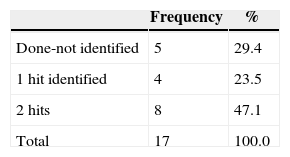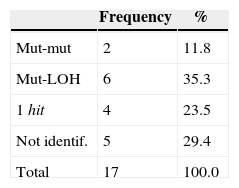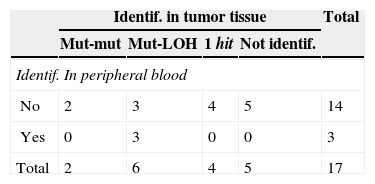To determine the importance of intratumoral genetic analysis in the diagnosis of germ-line mutations in patients with retinoblastoma. To underline the importance of performing these genetic tests in every case of retinoblastoma.
MethodIntratumoral genetic analysis of RB1 mutation was performed on 17 enucleated eyes that were non-responsive to conservative treatment. Patients had no family history of retinoblastoma, and lesions were always single. The identified mutations were then also studied in peripheral blood analysis.
ResultsThere were 12 (70.6%) cases with positive results in intratumoral analysis. In 8 cases (47.1%) mutation of both RB1 alelli were detected, and in 4 (23.5%) cases only one allele was found mutated. In 5 patients (29.4%) no mutation was identified. In the first hit, mutations comprised 7 frameshift or nonsense and 2 splice, whereas in the second hit, one splice mutation, 2 nonsense and 8 loss of heterozygosity were identified. Among 6 patients where intratumoral analysis detected a single mutation associated with a loss of heterozygosity, the peripheral blood analysis was able to detect the same mutation in 3 cases (50%).
ConclusionsIntratumoral genetic analysis of sporadic retinoblastoma can detect germ-line mutations. These patients are at higher risk of bilateralization and development of second tumors or trilateral retinoblastoma. Genetic screening is recommended in every patient diagnosed with retinoblastoma.
Determinar la importancia del análisis genético en tejido tumoral para identificar la afectación de la línea germinal. Demostrar la importancia de realizar el test genético en todos los casos de retinoblastoma.
MétodoSe realiza análisis genético intratumoral para el gen RB1 en 17 globos enucleados sin respuesta al tratamiento conservador, con lesiones únicas y unilaterales en pacientes sin antecedentes familiares de retinoblastoma. Posteriormente, se comprueba la presencia de las mutaciones identificadas intratumoralmente en sangre periférica.
ResultadoDe un total de 17 casos con estudio intratumoral, con resultados positivos en 12 (70,6%), se ha identificado la mutación de los 2 alelos del gen RB1 en 8 (47,1%), en 4 (23,5%) se ha identificado la mutación de un solo alelo y en 5 (29,4%) no se ha podido identificar ninguna de las alteraciones genéticas. El tipo de alteraciones genéticas identificadas en el primer hit han sido 7 mutaciones del tipo frameshift o nonsense y 2 del tipo splice. En el segundo hit se ha identificado una mutación de tipo splice, 2 tipo nonsense y 8 pérdidas de heterocigosidad. Se ha identificado en sangre periférica la mutación puntual de 3 de los pacientes en los que se había identificado en tejido intratumoral una mutación puntual y una pérdida de heterocigosidad.
ConclusionesEl análisis genético intratumoral en casos clínicamente esporádicos ha resultado eficaz para demostrar la existencia de la afectación de la línea germinal, con riesgo de bilateralizacion o desarrollo de retinoblastoma trilateral o segundas neoplasias. El screening genético se debe realizar en todos los pacientes con retinoblastoma.
Artículo
Comprando el artículo el PDF del mismo podrá ser descargado
Precio 19,34 €
Comprar ahora









